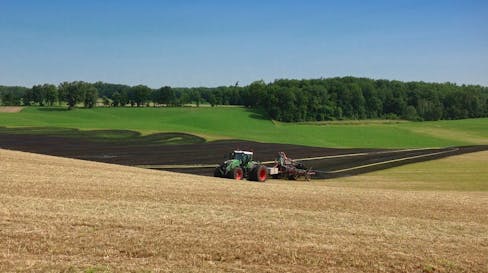More and more agricultural operations are turning to the use of biosolids and other soil amendments in place of commercial fertilizers. Biosolids provide essential nutrients such as nitrogen and phosphorus for healthier plant growth while also containing micro nutrients that enhance the growth process and help increase crop yields. They also add organic matter, increase moisture retention, and reduce soil erosion. Biosolids continue to be safe to use as demontrated by scientific evidence by government scientists, health experts, and agronomists.
Understanding that our soils are an essential component to a sustainable future, Wessuc is dedicated to the beneficial use of organic residuals in an environmentally responsible manner. Wessuc handles over 400,000 m3 of organic waste per year for various municipal and industrial clients. Land application is done with the latest in spreading equipment, using tractors with a continuously variable transmission for accurate speed control and application rates.
Reduce Fertilizer
The use of biosolids reduces the dependency on synthetic fertilizer. Synthetic fertilizer takes a tremendous amount of fossil fuel to manufacture. In contrast, the production of biosolids is a source of energy rather than a waste of it.
Better Crops
Healthy soils increase crop yields while reducing dependency on synthetic fertilizers. Farmers using biosolids have experienced an increase of 50-75 bushels per acre in corn yields compared to the use of synthetic fertilizer. Healthier soil, also improves the water holding capacity of the soil, thereby reducing runoff.
Decrease Carbon Footprint
Biosolids help to fight climate change by sequestering carbon in the soil and offsetting carbon emissions associated with synthetic fertilizer. Using 100,000 tonnes of biosolids as a soil amendment offsets over 35,000 tons of CO2 equivalents. That’s like taking over 6,000 cars off the road!
A Better Environment
Soils host at least one quarter of the world’s biodiversity. They are key in the carbon cycle. They help us to mitigate and adapt to climate change. They play a role in water management and in improving resilience to floods and droughts. Biosolids → healthier soil → a better environment.
Biosolids - Naturally Sustainable
Biosolids are nutrient-rich, processed organic material derived from wastewater treatment. They contain nitrogen, phosphorous, organic matter and micro-nutrients such a zinc, magnesium and copper, all of which are essential for crop growth.
Municipal wastewater treatment facilities separate the liquid and solid portions of wastewater. The solid portion undergoes biological treatment during which organic material is digested, or stabilized, by microorganisms. This treatment typically lasts 15-30 days and removes contaminants and harmful organisms. It is this treatment that distinguishes biosolids from sewage sludge. Upon completion of the treatment, biosolids must be analyzed for acceptability for agricultural use. This ensures that biosolids meet the quality standards, set by the Province of Ontario, and are suitable for land application.
For more information on the beneficial use of biosolids please watch the video or follow the links below:
Manure Application
Planning, mixing, pumping, haulage and spreading services are available to help you get the most out of you manure nutrient resource. We have extensive experience with nutrient management plans and will provide all required documentation including GPS spreading data for your records. Field operators are OMAFRA trained and licensed to ensure nutrients are placed at the right time, right place, and right amount. Environmentally sensitive features of each field will be reviewed prior to application to ensure appropriate protection measures are in place. Our operators can move up to 1 million imperial gallons per day depending on the field location, material consistency, and site characteristics.





Revved-down
Wessuc's Fendt tractors automatically reduce the engine speed while maintaining power and speed. This results in fuel savings and pollution reduction.
More tilage. Less flow.
Wessuc's injector bars are setup with a flow metre and flow control. Providing even distribution across a 23 foot span.
Protective measures
Soil type, field slope, crop residue, crop schedule, water courses, field tile inlets, spreading method, proximity to neighbours and other environmentally sensitive features all play a role in how a field is managed and determine how or if a field can receive biosolids. The site conditions and management plan are presented for approval prior to spreading. Setbacks from sensitive features are established based on the regulations set forth in the Nutrient Management Act. These are just some of the required conditions which are essential for the safe application of biosolids.
Nutrient Management Act (NMA)
As of January 2011 each site that receives biosolids is approved by the Ministry of Agriculture, Food and Rural Affairs. Historically this task was completed by the Ministry of the Environment through a Certificate of Approval process. That system was replaced under the Nutrient Management Act to account for better nutrient management on agricultural land through the issuing of approved Non-Agricultural Source Material (NASM) plans. The nutrient management plans will account for all nutrients the grower will use, either organic or commercial sources. In this way excessive nutrient loading of fields which may cause environmental impairment will be eliminated.

Environmentally serious.
Wessuc takes it's responsibility as environmental stewards very seriously. Licensed technicians operate equipment at each of the sites. Every field is flagged to ensure setbacks are maintained. The operators are provided aerial maps of the site highlighting sensitive features, and the application to each site is GPS mapped providing a record of the site volume, weather conditions, timing, application rate, injection depth, and site topography. Wessuc's flow controlled spreading units ensure an even application rate regardless of topography or flow rate.
OMAFRA & MoECC
Starting in 2011, as the focus of biosolids management moves toward a holistic nutrient management approach, the Ministry of Agriculture, Food and Rural Affairs (OMAFRA) will be reviewing and approving NASM plans. OMAFRA is closely tied to the agricultural community and well placed to ensure biosolids nutrients are effectively managed throughout the province. Concurrently the Ministry of the Environment and Climate Change (MoECC) will be focusing their attention on the adherence of contractors and growers to the conditions set forth both in NASM plans and Nutrient Management plans.
The Ministry of Environment and Climate Change (MOECC) has strict regulations about the composition of biosolids for use in agricultural applications, with tests done and/or and overseen by the ministry at the treatment plants, the storage facilities and at the fields to which the NASM is applied.
